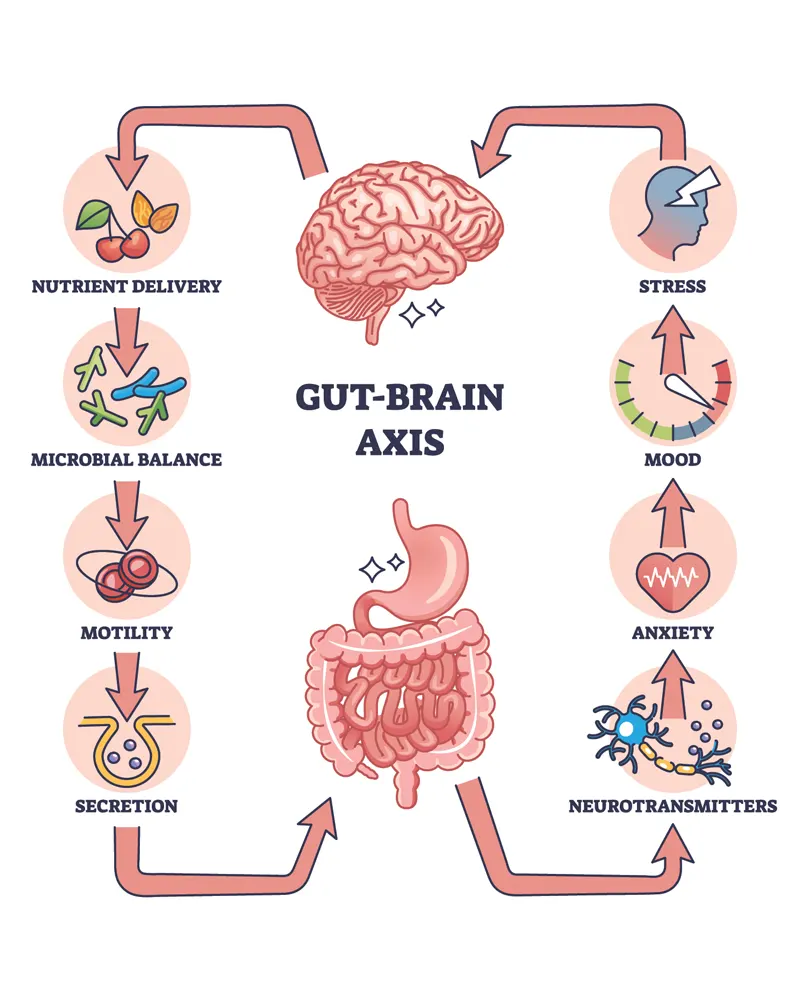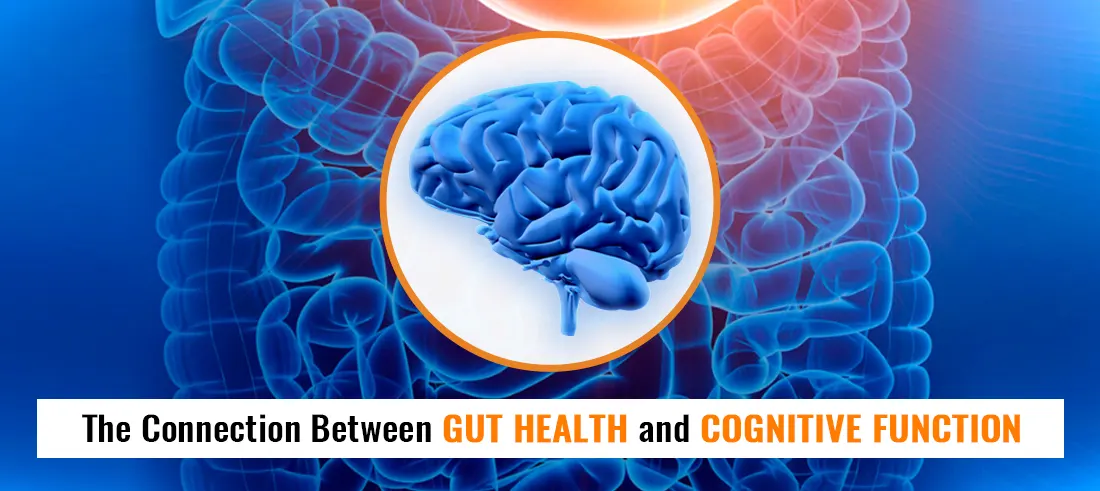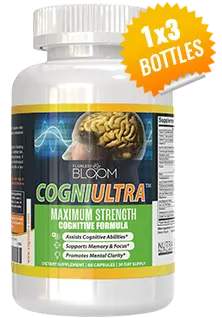Understanding the Gut-Brain Connection: How Your Digestive Health Impacts Cognitive Function
You’ve probably heard the saying “trust your gut” or felt butterflies in your stomach when you’re nervous. These aren’t just old wives’ tales or random sensations – they’re real examples of the powerful connection between your gut and brain.
The gut-brain connection, also known as the gut-brain axis, is a complex communication system that links your digestive tract with your brain. This connection is so strong that scientists often refer to the gut as the “second brain.”
How does it work?
Your gut and brain are connected both physically and biochemically:
- The vagus nerve: This is the superhighway of communication between your gut and brain. It sends signals in both directions, keeping your brain informed about what’s happening in your digestive system and vice versa.
- Neurotransmitters: These chemical messengers aren’t just found in your brain – your gut produces them too! For example, about 95% of your body’s serotonin, a key mood regulator, is actually made in your gut.
- The gut microbiome: The trillions of bacteria living in your gut play a crucial role in this connection. They produce various compounds that can influence your brain function and mood.
Michael Villarreal, CADC, Certified Alcohol & Drug Counselor & CEO said- The vagus nerve sends signals from the gut to the brain and vice versa, influencing processes like digestion, immune function, and even stress response. Stimulating the vagus nerve through practices like deep breathing, meditation, or even cold exposure can help strengthen this connection, improving gut health and potentially enhancing mental clarity and emotional balance.
Understanding this connection helps explain why digestive issues can affect your mental state, and why stress or anxiety can upset your stomach. It’s all part of the same system!
Exploring the Brain-Gut Microbiome Axis: The Science Behind the Gut and Brain Relationship
Let’s dive a bit deeper into the fascinating world of the brain-gut microbiome axis. This term might sound complex, but it essentially describes the two-way street of communication between your brain, your gut, and the trillions of tiny microorganisms that call your gut home.
The key players in this relationship
- The Brain: Your command center, responsible for thoughts, emotions, and controlling bodily functions.
- The Gut: Your digestive system, which does more than just process food.
- The Microbiome: The community of bacteria, fungi, and other microorganisms living in your gut.
These three elements are in constant communication, influencing each other in ways we’re only beginning to understand.
How does this communication happen?
- Neural pathways: Your gut has its own nervous system called the enteric nervous system. It communicates with your brain through nerves like the vagus nerve.
- Hormones: Your gut releases hormones that can travel through your bloodstream to affect brain function.
- Immune system: Your gut is a major part of your immune system. The state of your gut can influence inflammation throughout your body, including in your brain.
- Microbial byproducts: The bacteria in your gut produce various substances that can influence your brain and behavior.
This intricate communication system explains why what happens in your gut doesn’t stay in your gut – it can affect your mood, cognitive function, and even behavior!
How Gut Health Affects Brain Function: The Role of the Gut Microbiome in Mental Clarity
 gut-and-brain-connection
gut-and-brain-connectionNow that we understand the connection between our gut and brain, let’s explore how the health of our gut, particularly our gut microbiome, can impact our brain function and mental clarity.
The Gut Microbiome: Your Mental Health Ally
Your gut microbiome, that bustling community of microorganisms in your digestive tract, plays a crucial role in your mental health and cognitive function. Here’s how:
- Neurotransmitter production: As mentioned earlier, gut bacteria help produce neurotransmitters like serotonin and gamma-aminobutyric acid (GABA). These chemicals are crucial for regulating mood and cognitive function.
- Stress response: A healthy gut microbiome can help regulate your body’s stress response, potentially reducing anxiety and depression.
- Inflammation control: Certain gut bacteria help control inflammation in the body. Chronic inflammation has been linked to various mental health issues and cognitive decline.
- Nutrient absorption: Your gut microbiome helps your body absorb and metabolize nutrients that are essential for brain health, like B vitamins and omega-3 fatty acids.
Signs of an Unhealthy Gut Affecting Your Brain
If your gut microbiome is out of balance, you might experience:
- Brain fog or difficulty concentrating
- Mood swings
- Anxiety or depression
- Memory problems
- Sleep issues
Remember, a happy gut often means a happier, clearer mind!
The Link Between Alzheimer’s and Gut Health: New Research Confirms the Connection
Recent scientific discoveries have shed light on a surprising connection: the link between gut health and Alzheimer’s disease. This groundbreaking research is opening up new avenues for understanding and potentially treating this devastating neurological condition.
What the Research Says
Several studies have found intriguing connections between gut health and Alzheimer’s:
- Gut bacteria and brain inflammation: Some research suggests that certain types of gut bacteria may increase inflammation in the brain, a key factor in Alzheimer’s development.
- Leaky gut syndrome: A “leaky” intestinal barrier may allow harmful substances to enter the bloodstream and eventually reach the brain, potentially contributing to cognitive decline.
- Gut metabolites: Certain substances produced by gut bacteria have been found to protect against the development of Alzheimer’s.
- Microbiome diversity: People with Alzheimer’s often have less diverse gut microbiomes compared to healthy individuals of the same age.
Implications for Prevention and Treatment
While this research is still in its early stages, it opens up exciting possibilities:
- Diet as prevention: Eating a diet that promotes a healthy gut microbiome might help reduce the risk of Alzheimer’s.
- Probiotics and prebiotics: These supplements might play a role in Alzheimer’s prevention or treatment by promoting a healthy gut microbiome.
- New diagnostic tools: Changes in the gut microbiome could potentially be used as early warning signs for Alzheimer’s risk.
- Novel treatments: Future Alzheimer’s treatments might target the gut microbiome in addition to the brain.
Remember, while this research is promising, it’s still evolving. Always consult with healthcare professionals for the most up-to-date advice on Alzheimer’s prevention and treatment.
The Gut-Brain Axis: A New Pathway for Improving Cognitive Health
 gut-brain-axis
gut-brain-axisThe gut-brain axis isn’t just a fascinating scientific concept – it’s a potential game-changer in how we approach cognitive health. By understanding and harnessing the power of this connection, we may be able to boost our brain function and protect against cognitive decline.
Leveraging the Gut-Brain Axis for Better Cognitive Health
Here are some ways you can use the gut-brain axis to your advantage:
- Eat a brain-boosting diet: Focus on foods that are good for both your gut and your brain. This includes:
- Omega-3 rich foods like fatty fish
- Fermented foods like yogurt and kimchi
- High-fiber foods like whole grains and legumes
- Colorful fruits and vegetables rich in antioxidants
- Manage stress: Chronic stress can negatively impact both your gut and brain health. Try stress-reduction techniques like meditation, yoga, or deep breathing exercises.
- Get moving: Regular exercise is good for your gut microbiome and your brain. Aim for at least 30 minutes of moderate activity most days of the week.
- Prioritize sleep: Good sleep is crucial for both gut and brain health. Aim for 7-9 hours of quality sleep each night.
- Stay hydrated: Proper hydration supports gut health and cognitive function.
- Consider probiotics: Talk to your healthcare provider about whether probiotic supplements might be beneficial for you.
The Future of Cognitive Health
As we learn more about the gut-brain axis, we’re likely to see new strategies for improving cognitive health and preventing neurological disorders. This might include:
- Personalized nutrition plans based on individual gut microbiome profiles
- New probiotic strains specifically designed to support brain health
- Treatments for neurological conditions that target the gut as well as the brain
By taking care of your gut, you’re not just supporting your digestive health – you’re giving your brain a boost too!
Boosting Cognitive Functions Through Gut Health: What You Need to Know
Understanding the connection between gut health and cognitive function is one thing, but putting that knowledge into action is another. Here’s a practical guide to boosting your brain power through your gut health.
 Gut Microbiome and Cognitive Functions
Gut Microbiome and Cognitive FunctionsKey Strategies for a Brain-Boosting Gut
- Diversify Your Diet:
- Eat a wide variety of fruits, vegetables, whole grains, and lean proteins.
- Include prebiotic foods like garlic, onions, and leeks to feed your good gut bacteria.
- Don’t forget fermented foods like yogurt, kefir, and sauerkraut for a probiotic boost.
- Stay Hydrated:
- Drink plenty of water throughout the day.
- Herbal teas can also support both gut and brain health.
- Limit Processed Foods:
- Cut back on sugary snacks, artificial sweeteners, and highly processed foods.
- Get Your Omega-3s:
- Include fatty fish, chia seeds, or walnuts in your diet.
- Omega-3s support both gut and brain health.
- Manage Stress:
- Practice stress-reduction techniques like meditation or deep breathing.
- Chronic stress can negatively impact both gut and brain health.
- Exercise Regularly:
- Aim for at least 30 minutes of moderate exercise most days.
- Physical activity benefits both your gut microbiome and your brain.
- Prioritize Sleep:
- Aim for 7-9 hours of quality sleep each night.
- Good sleep habits support both gut and cognitive health.
- Consider Supplements:
- Talk to your healthcare provider about probiotic or prebiotic supplements.
- They might recommend specific strains known to support cognitive function.
Remember: It’s a Journey, Not a Quick Fix
Improving your gut health and cognitive function is a gradual process. Don’t expect overnight results. Instead, focus on making sustainable, long-term changes to your lifestyle and diet. Your gut – and your brain – will thank you!
The Role of Gut Health in Preventing Cognitive Decline and Alzheimer’s
As we age, maintaining cognitive health becomes increasingly important. The good news is that taking care of your gut health might be a powerful tool in preventing cognitive decline and reducing the risk of conditions like Alzheimer’s disease.
How Gut Health Influences Cognitive Aging
- Inflammation Control: A healthy gut helps keep inflammation in check throughout your body, including your brain. Chronic inflammation is a known risk factor for cognitive decline and Alzheimer’s.
- Neurotransmitter Production: Your gut microbiome plays a crucial role in producing neurotransmitters that affect mood and cognitive function.
- Nutrient Absorption: A healthy gut is better at absorbing nutrients essential for brain health, such as B vitamins and omega-3 fatty acids.
- Immune Function: Your gut is a major part of your immune system. A healthy gut microbiome can help protect against infections and chronic diseases that might contribute to cognitive decline.
Practical Steps for Long-Term Brain Health
- Embrace the Mediterranean Diet: This diet, rich in fruits, vegetables, whole grains, and healthy fats, has been linked to both better gut health and reduced risk of cognitive decline.
- Stay Physically Active: Regular exercise benefits both your gut microbiome and your brain health.
- Manage Chronic Conditions: Conditions like diabetes and high blood pressure can impact both gut and brain health. Work with your healthcare provider to keep these under control.
- Stay Socially Connected: Social interaction is good for your brain and can help reduce stress, which is beneficial for your gut.
- Keep Learning: Engaging in mentally stimulating activities throughout life is associated with better cognitive health in older age.
- Consider Fermented Foods: Regular consumption of fermented foods like yogurt, kefir, or kimchi might help maintain a healthy gut microbiome as you age.
- Limit Alcohol and Quit Smoking: Both excessive alcohol consumption and smoking can negatively impact gut and brain health.
The Future of Alzheimer’s Prevention
As research into the gut-brain connection continues, we may see new strategies for preventing Alzheimer’s that focus on maintaining a healthy gut microbiome throughout life. While there’s still much to learn, taking steps to support your gut health today could be a valuable investment in your cognitive future. Supplements like CogniUltra® have evidence backed natural ingredient to support you cognitive function.
Remember, it’s never too early – or too late – to start taking care of your gut and your brain. Small changes in your daily habits can add up to significant benefits over time. Here’s to a healthy gut and a sharp mind for years to come!
FAQs
What is the gut-brain connection?
The gut-brain connection, also known as the gut-brain axis, is the communication system between your digestive tract and your brain. It involves physical connections through nerves, chemical connections through neurotransmitters, and biological connections through your gut microbiome.
Can improving my gut health really boost my brain function?
Yes, improving your gut health can potentially boost your brain function. A healthy gut microbiome helps produce neurotransmitters that affect mood and cognition, reduces inflammation that can impact brain health, and aids in the absorption of nutrients crucial for brain function.
What foods are good for both gut and brain health?
Foods that are good for both gut and brain health include fiber-rich fruits and vegetables, fermented foods like yogurt and kimchi, omega-3-rich foods like fatty fish, and whole grains. These foods support a diverse gut microbiome, provide important nutrients for brain health, and can help reduce inflammation.
How does stress affect the gut-brain connection?
Stress can significantly impact the gut-brain connection. It can alter the composition of your gut microbiome, increase gut permeability (leading to “leaky gut”), and affect the production of neurotransmitters in the gut. Chronic stress can lead to digestive issues and potentially contribute to mood disorders or cognitive problems. Managing stress through techniques like meditation, exercise, or deep breathing can help maintain a healthy gut-brain connection.
Are probiotics helpful for brain health?
Probiotics can potentially be helpful for brain health, although more research is needed. Some studies have shown that certain probiotic strains can reduce symptoms of anxiety and depression, improve mood, and potentially even enhance cognitive function.
How long does it take to see cognitive benefits from improving gut health?
The time it takes to see cognitive benefits from improving gut health can vary from person to person. Some people might notice improvements in mental clarity or mood within a few weeks of making dietary changes or starting a probiotic regimen.
Can poor gut health contribute to Alzheimer’s disease?
Recent research suggests that poor gut health may potentially contribute to Alzheimer’s disease, although the exact relationship is still being studied. Some theories propose that an unhealthy gut microbiome could increase inflammation and the production of harmful proteins associated with Alzheimer’s.




